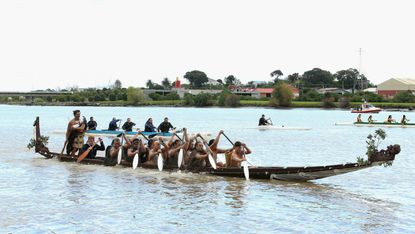New Zealand river 'must be treated like a person'
Legislation ends 140-year battle for Whanganui to be recognised as a Maori ancestor

A river in New Zealand has been granted the same legal rights as a human being, ending the longest-running legal dispute in the country's history.
The Whanganui, which is the third-largest river in New Zealand, is now considered by the country's parliament to be legally inseparable from the Maori people who claim it as their home.
The Whanganui tribe have fought for 140 years for the law to recognise the river as their ancestor.
Subscribe to The Week
Escape your echo chamber. Get the facts behind the news, plus analysis from multiple perspectives.

Sign up for The Week's Free Newsletters
From our morning news briefing to a weekly Good News Newsletter, get the best of The Week delivered directly to your inbox.
From our morning news briefing to a weekly Good News Newsletter, get the best of The Week delivered directly to your inbox.
Treating a river like a person is not unusual for the Maori community, who have a saying that goes: "I am the river and the river is me."
Hundreds of representatives from the tribe broke into a traditional song in parliament when their legal battle came to an end, the New Zealand Herald reports.
The river will be now be represented by two people; one legal guardian from the Crown and one from the Whanganui tribe, The Guardian reports.
Gerrard Albert, the Whanganui chief negotiator, says the ruling represents a victory against the "traditional model for the last 100 years of treating it [the river] from a perspective of ownership and management".
He says the tribe is not "anti-development" or opposed to the economic use of the river, but is simply seeking respect and the acknowledgement of their world view.
Treaty negotiations minister Chris Finlayson says he's aware that "some people will say it's pretty strange", but insists the river's new status is "no stranger than family trusts, or companies or incorporated societies".
Previous court rulings have enabled businesses to be treated like individuals under some aspects of the law, but this is the first time in history that a geographical feature has been granted legal personhood.
Create an account with the same email registered to your subscription to unlock access.
Sign up for Today's Best Articles in your inbox
A free daily email with the biggest news stories of the day – and the best features from TheWeek.com
-
 Ukraine cheers House approval of military aid
Ukraine cheers House approval of military aidSpeed Read Following a lengthy struggle, the House has approved $95 billion in aid for Ukraine and Israel
By Peter Weber, The Week US Published
-
 Olive oil: alternatives for the 'liquid gold'
Olive oil: alternatives for the 'liquid gold'The Week Recommends As the price of this store cupboard staple has rocketed, we look at ways to save and other oils to use for cooking
By Adrienne Wyper, The Week UK Published
-
 Scotland Yard, Gaza and the politics of policing protests
Scotland Yard, Gaza and the politics of policing protestsTalking Point Met Police accused of 'two-tier policing' by former home secretary as new footage emerges of latest flashpoint
By The Week UK Published
-
 Puffed rice and yoga: inside the collapsed tunnel where Indian workers await rescue
Puffed rice and yoga: inside the collapsed tunnel where Indian workers await rescueSpeed Read Workers trapped in collapsed tunnel are suffering from dysentery and anxiety over their rescue
By Sorcha Bradley, The Week UK Published
-
 Cops call woman over hair hanging out of car
Cops call woman over hair hanging out of carTall Tales And other stories from the stranger side of life
By Chas Newkey-Burden, The Week UK Published
-
 Celine Dion 'civil war' in New Zealand
Celine Dion 'civil war' in New ZealandTall Tales And other stories from the stranger side of life
By Chas Newkey-Burden, The Week UK Published
-
 Gaza hospital blast: What the video evidence shows about who's to blame
Gaza hospital blast: What the video evidence shows about who's to blameSpeed Read Nobody wants to take responsibility for the deadly explosion in the courtyard of Gaza's al-Ahli Hospital. Roll the tape.
By Peter Weber, The Week US Published
-
 Giraffe poo seized after woman wanted to use it to make a necklace
Giraffe poo seized after woman wanted to use it to make a necklaceTall Tales And other stories from the stranger side of life
By Chas Newkey-Burden, The Week UK Published
-
 Helicopter sound arouses crocodiles
Helicopter sound arouses crocodilesTall Tales And other stories from the stranger side of life
By Chas Newkey-Burden, The Week UK Published
-
 Woman sues Disney over 'injurious wedgie'
Woman sues Disney over 'injurious wedgie'Tall Tales And other stories from the stranger side of life
By Chas Newkey-Burden, The Week UK Published
-
 Emotional support alligator turned away from baseball stadium
Emotional support alligator turned away from baseball stadiumTall Tales And other stories from the stranger side of life
By Chas Newkey-Burden, The Week UK Published